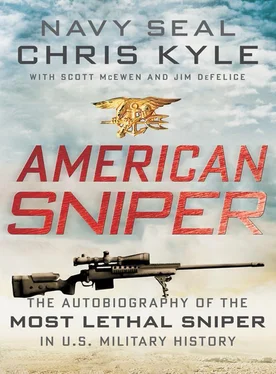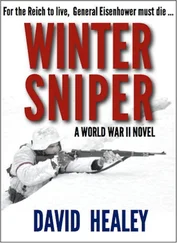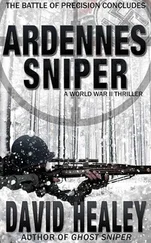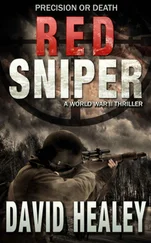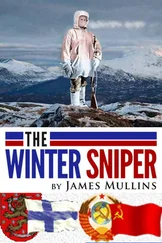The elections came and went.
The media back in the States made a big thing of the Iraqi government elections, but it was a nonevent for me. I wasn’t even out that day; I caught it on TV.
I never really believed the Iraqis would turn the country into a truly functioning democracy, but I thought at one point that there was a chance. I don’t know that I believe that now. It’s a pretty corrupt place.
But I didn’t risk my life to bring democracy to Iraq. I risked my life for my buddies, to protect my friends and fellow countrymen. I went to war for my country, not Iraq. My country sent me out there so that bullshit wouldn’t make its way back to our shores.
I never once fought for the Iraqis. I could give a flying fuck about them.
Ashort while after the election, I was sent back to my SEAL platoon. Our time in Iraq was growing short, and I was starting to look forward to going home.
Being at camp in Baghdad meant I had my own little room. My personal gear filled four or five cruise boxes, two big Stanley roller boxes, and assorted rucks. (Cruise boxes are the modern equivalent of footlockers; they’re waterproof and roughly three feet long.) On deployment, we pack heavy.
I also had a TV set. All the latest movies were on pirated DVDs selling at Baghdad street stands for five bucks. I bought a box set of James Bond movies, some Clint Eastwood, John Wayne—I love John Wayne. I love his cowboy movies especially, which makes sense I guess. Rio Bravo may be my favorite.
Besides movies, I spent a bit of time playing computer games—Command and Conquer became a personal favorite. Smurf had a PlayStation, and we started getting into playing Tiger Woods.
I kicked his butt.
With Baghdad settling down, at least for the moment, the head shed decided they wanted to open up a SEAL base in Habbaniyah.
Habbaniyah is twelve miles to the east of Fallujah, in Anabar Province. It wasn’t quite the hotbed of the insurgency that Fallujah had been, but it wasn’t San Diego, either. This is the area where before the First Gulf War, Saddam built chemical plants devoted to manufacturing weapons of mass destruction, such as nerve gas and other chemical agents. There weren’t a lot of America supporters out there.
There was a U.S. Army base though, run by the famous 506th Regiment—the Band of Brothers. They’d just come over from Korea and, to be polite, had no fucking clue what Iraq was all about. I suppose everybody’s gotta learn the hard way.
Habbaniyah turned out to be a real pain in the ass. We’d been given an abandoned building, but it was nowhere near adequate for what we needed. We had to build a TOC—a tactical operations command—to house all the computers and com gear that helped support us during our missions.
Our morale sunk. We weren’t doing anything useful for the war; we were working as carpenters. It’s an honorable profession, but it’s not ours.
Taya:
It was on this deployment that the medical doctors did a test and, for some reason, thought Chris had TB. The doctors told him he would eventually die of the disease.
I remember talking to him right after he got the news. He was fatalistic about it. He’d already accepted that he was going to die, and he wanted to do it there, not at home from a disease he couldn’t fight with a gun or his fists.
“It doesn’t matter,” he told me. “I’ll die and you’ll find someone else. People die out here all the time. Their wives go on and find someone else.”
I tried to explain to him that he was irreplaceable to me. When that didn’t seem to faze him, I tried another equally valid point. “But you’ve got our son,” I told him.
“So what? You’ll find someone else and that guy will raise him.”
I think he was seeing death so often that he started to believe people were replaceable.
It broke my heart. He truly believed that. I still hate to think that.
He thought dying on the battlefield was the greatest. I tried to tell him differently, but he didn’t believe it.
They redid the tests, and Chris was cleared. But his attitude about death stayed.
Once the camp was settled, we started doing DAs. We’d be given the name and location of a suspected insurgent, hit his house at night, then come back and deposit him and whatever evidence we gathered at the DIF—Detention and Interrogation Facility, your basic jail.
We’d take pictures along the way. We weren’t sightseeing; we were covering our butts, and, more important, those of our commanders. The pictures proved we hadn’t beaten the crap out of him.
Most of these ops were routine, without much trouble and almost never any resistance. One night, though, one of our guys went into a house where a rather portly Iraqi decided he didn’t want to come along nicely. He started to tussle.
Now, from our perspective, our brother SEAL was getting the shit kicked out of him. According to the SEAL in question, he had actually slipped and was in no need of assistance.
I guess you can interpret it any way you want. We all rushed in and grabbed the fatso before he could do much harm. Our friend got ribbed about his “fall” for a while.
On most of these missions, we had photos of the person we were supposed to get. In that case, the rest of the intelligence tended to be pretty accurate. The guy was almost always where he was supposed to be, and things pretty much followed the outline we had drawn up.
But some cases didn’t go so smoothly. We began realizing that if we didn’t have a photo, the intelligence was suspect. Knowing that the Americans would bring a suspect in, people were using tips to settle grievances or feuds. They’d talk to the Army or some other authority, making claims about a person helping the insurgency or committing some other crime.
It sucked for the person we arrested, but I didn’t get all that worked up about it. It was just one more example of how screwed up the country was.
One day, the Army asked for a sniper overwatch for a 506th convoy that was coming into base.
I went out with a small team and we took down a three- or four-story building. I set up in the top floor and started watching the area. Pretty soon the convoy headed down the road. As I was watching the area, a man came out of a building near the road and began maneuvering in the direction the convoy was going to take. He had an AK.
I shot him. He went down.
The convoy continued through. A bunch of other Iraqis came out and gathered around the guy I’d shot, but nobody that I could see made any threatening motions toward the convoy or looked to be in a position to attack it, so I didn’t fire.
A few minutes later, I heard on the radio that the Army is sending a unit out to investigate why I shot him.
Huh?
I had already told the Army command on the radio what had happened, but I got back on the radio and repeated it. I was surprised—they didn’t believe me.
A tank commander came out and interviewed the dead man’s wife. She told them her husband was on his way to the mosque carrying a Koran.
Uh-huh. The story was ridiculous, but the officer—whom, I’m guessing, hadn’t been in Iraq very long—didn’t believe me. The soldiers began to look around for the rifle, but by that time so many people had been in the area that it was long gone.
The tank commander pointed out my position. “Did it come from there?”
“Yes, yes,” said the woman, who, of course, had no idea where the shot had come from, since she hadn’t been anywhere nearby. “I know he’s Army, because he’s wearing an Army uniform.”
Читать дальше
